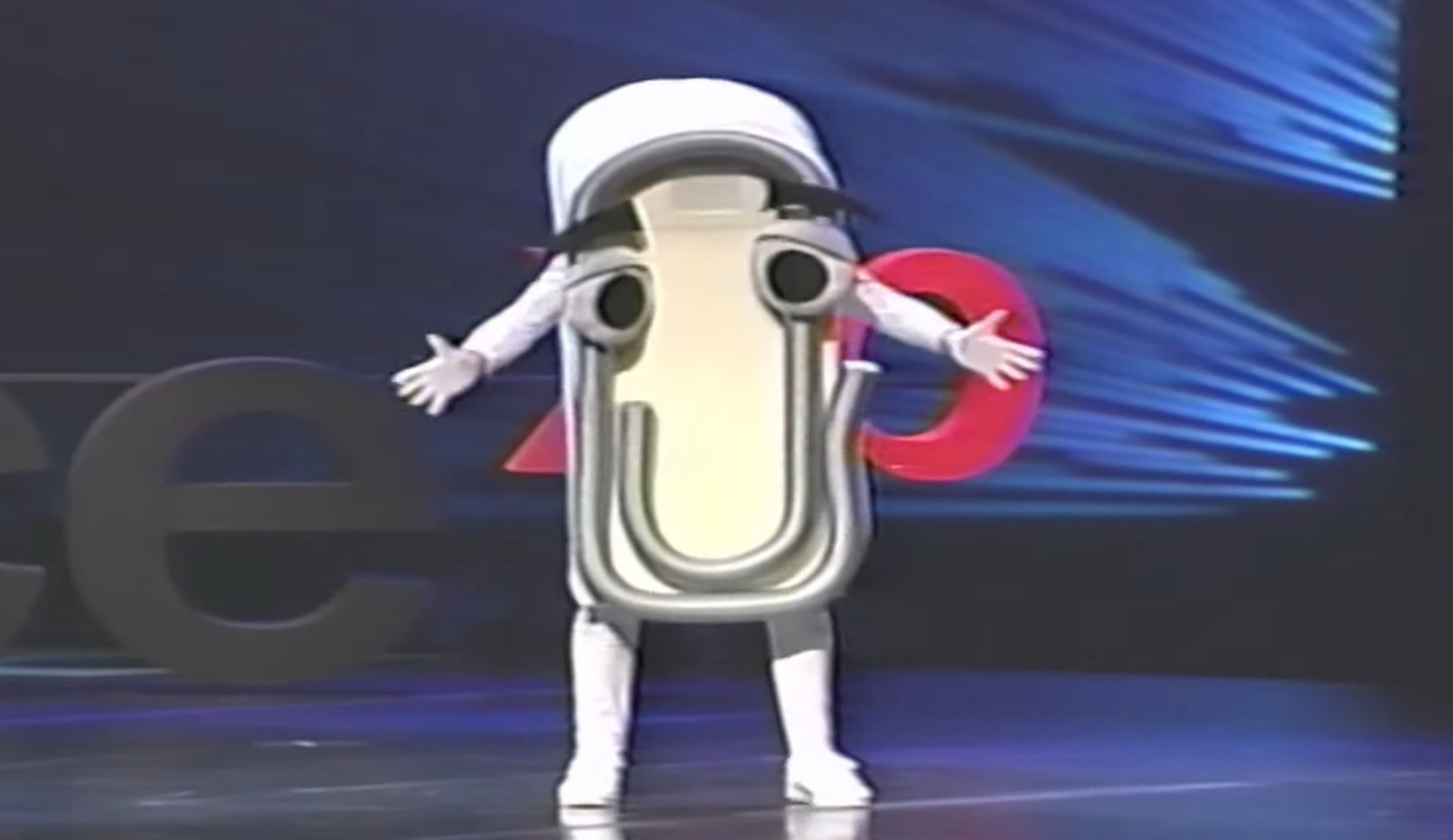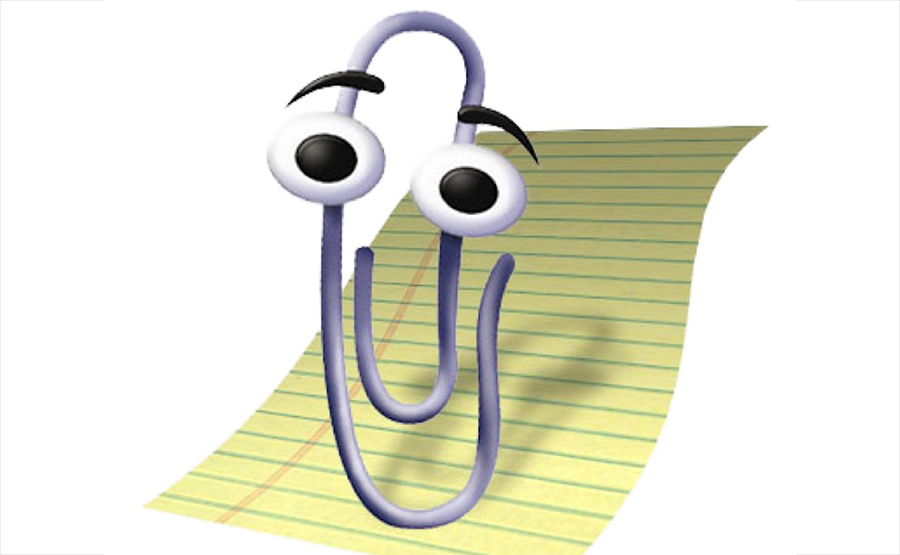Clippy did nothing wrong
"It looks like you're writing an article!"

Clippy, Microsoft Word's perpetually upbeat '90s paperclip, is a joke. An embarrassment. A mercifully discarded relic of the distant past. An ugly sweater.
I know that, and I'm sure you know that too. And I'm also sure it's no accident this worthless retro irritant's most visible recent comeback is as a little weapon charm in Halo Infinite, just so everyone can ruthlessly rocket launcher him into splattered Spartan oblivion over and over again. Everybody hates Clippy, the useless failure of a "virtual assistant" who was rightfully dragged into life's recycle bin years ago.
Or do they?
Clippy is good.
This "truth" I've unthinkingly regurgitated for decades vaporised faster than a vital email attachment the instant I saw the wiry little guy in his original habitat again. The secondhand experiences from the internet's bottomless well of memes, the fuzzy memories formed when I was a teenager desperately trying to write an essay the week after it was supposed to be handed in, and this, uh, erotic Clippy fiction I really wish I hadn't stumbled upon when I was looking up Clippy-related quotes this morning, simply don't match up with plain old reality.
Brace yourselves for this cold splash of Windows history-altering reality: Clippy is good.
Last month I had the pleasure of opening up an old Windows 98SE laptop for the first time in literally decades (Microprose's 1997 Magic: The Gathering game really needs a modern re-release, although that's a complaint for another article), and for a bit of a nostalgic giggle I thought I'd start up the machine's old version of Word, ready to point and laugh at all the pathetic things the little paper clip "helper" who lives on as the internet's punching bag was about to say and do.
That laugh never came. Clippy was in fact not a tiny incompetent jester trying to ruin my document via intrusive pale yellow speech bubbles. He was a passive desktop object content to just stand there (as far as a paperclip with no legs can stand) and do nothing. I could even click him into oblivion if I wanted to.
Keep up to date with the most important stories and the best deals, as picked by the PC Gamer team.

So I did what any person with an imaginary axe to grind against a decades-old digital office feature would do and started typing, trying to goad the Fifth Paperclip of the Apocalypse that was surely lurking just below this benign surface into unleashing its pernickety and no doubt incorrect fury upon my text.
And that's when I got annoyed. Not only because I realised I'd been transported back to a happier time when document creation could be done offline and the program in question didn't expect me to sign up or subscribe to anything, but because the internet, that last bastion of truth and justice, had lied to me. Clippy wasn't an amusing desktop ornament stuffed with meme-able dialogue. He was helpf—OK so maybe he wasn't helpful—but he was trying to be.
It didn't take long before Clippy either completely misunderstood my text or was out of ideas entirely, but in the cold light of modernity I honestly appreciated bumping up against the edges of his database instead of being immediately funnelled towards similar "services" in a company's "digital ecosystem". He was never eager to push me towards an online "community" for advice, he never tried to nudge me into clicking on an "online training content" icon, he never made me stare at a help page that gave over a good chunk of my screen to a stock image of someone smiling at a laptop placed next to an artistically arranged pile of books. Clippy never asked me to pay up to unlock better advice.
It's this refreshingly simple and personable treatment that has made me a reformed fan of the little guy, to the point where I'd dare to say there's a Clippy-shaped hole in all of our modern office programs. I'd love to be offered bite-sized pieces of information by an amiable little character when I'm elbow-deep in another Google Doc at 4 am, rather than manually fish out some plain text on a flat white background that's been buried in a menu inside a menu.
Wouldn't it be so much better for all of us if we could ask a program's mascot for assistance instead of clicking through a weird adver-help plugin? Why did we scorn Clippy but allow ourselves to get used to performing text-Judo with a chatbot named Tracy every time we need help with something?
Wouldn't it be so much better if we could ask a mascot like Clippy? A mascot who doesn't pretend to know more than he does? Who doesn't masquerade as a human (other than by having eyebrows) at the other end of a sterile chat line?
I know the internet will probably always love to loathe him, but if you ask me that's only because he reminds us of how much we've lost. He's compact offline help; there if I need it, gone the instant I don't, and he isn't falling over himself to scrape delicious, saleable feedback data from every single mouse click or coerce me into giving up yet another email address. Clippy's divisive "personality"—in practice nothing more irritating than an attempt to deliver general tips in a more natural and engaging way—may not be to everyone's tastes, but at least he has one.
Perhaps what Windows 11 needs to be a true success isn't a redesigned Start menu or taskbar. It just needs to give us a friend.

When baby Kerry was brought home from the hospital her hand was placed on the space bar of the family Atari 400, a small act of parental nerdery that has snowballed into a lifelong passion for gaming and the sort of freelance job her school careers advisor told her she couldn't do. She's now PC Gamer's word game expert, taking on the daily Wordle puzzle to give readers a hint each and every day. Her Wordle streak is truly mighty.
Somehow Kerry managed to get away with writing regular features on old Japanese PC games, telling today's PC gamers about some of the most fascinating and influential games of the '80s and '90s.

